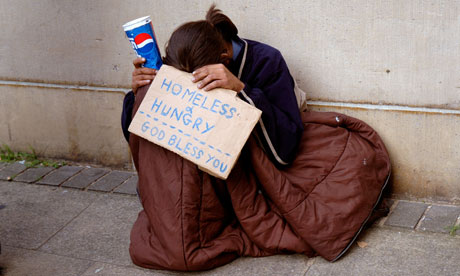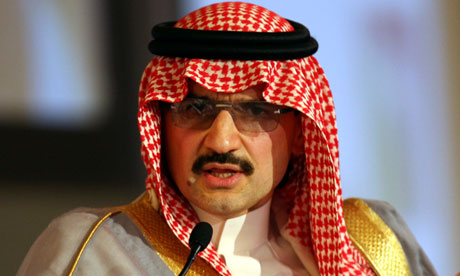The right is usually keen to champion entrepreneurs, but there's disdain for hard-working London beggar Simon Wright

Young person homeless, hungry and begging in London. Photograph: Alamy
There is a famous story in advertising folklore about David Ogilvy, founder of Ogilvy and Mather and one of the pioneers of the modern ad business. He was going down Fifth Avenue in New York and came across a blind man begging. The beggar had a sign: "I am blind, please help." But no one was helping – the beggar's hat was empty.
Ogilvy could have given him a dollar, but instead he did something more useful. He rewrote the beggar's sign. Now it read: "It is spring, and I am blind." The nickels and dimes poured in. Ogilvy had replaced a simple request for action with a story; he had added emotion to the man's appeal. People empathised with someone who could not fully partake of this most glorious season, and put their hands in their pockets.
I thought of the tale – some dispute its authenticity, but let that pass – when I read about Simon Wright, the beggar in Putney, south-west London, who has just been handed an asbo to stop him begging anywhere in London. Wright was probably Britain's most successful beggar, earning ("raking in" in the Mail's emotive language) £50,000 a year, living in a "smart" council flat, and spending his money in betting shops and amusement arcades.
In assessing the rights and wrongs of the case, one would really need to see the sign he was using. If, as the police say, he was claiming to be homeless, that is clearly misrepresentation – he needed an Ogilvy to produce a sign that was both effective and true. He also had a dog which some local people say was intimidating, but that sounds like an attempt to spice up the tale. Successful beggars' dogs usually look like they are in urgent need of some Winalot.
Leaving aside the specifics of whether the sign did perpetrate a fraud, the bigger point seems to be the old British story that we resent success – the "tall poppy syndrome" theMail generally likes to whine about. Wright was a man at the top of his profession, the ultimate advertising success story: someone who had cracked the puzzle of how to make a lot of people give you something for nothing. But that was his problem. People resented his success. No one can tolerate a successful beggar. Beggars really aren't allowed to be choosers. He had to be put back in his box.
The right is usually keen to champion hard-working entrepreneurs, so why be so sniffy about begging? It's a perfect market: we encounter many beggars; we can't give to them all, even if we would like to; so they have to be astute in their choice of location and the way they make their appeal. Ogilvy realised this: he produced a brilliant piece of advertising in a very demanding commercial sector. How do you make a passing stranger part with money for absolutely nothing other than a warm feeling inside?
Wright had chosen the perfect location: affluent Putney. He positioned himself near a bank, so people taking out £50 would feel guilty when they saw him. And he worked very hard. Even the police had to admit he was a Stakhanovite. "He worked pretty much every day, and had done so for about three years," they said. "He certainly put in the hours." His success produced a host of imitators – nine other beggars invaded his patch – but he saw them off, the original and the best, the No 1 begging brand on the block.
Here, then, was a man whose industry and commercial acumen would, you might think, be celebrated in coalition Britain. He was earning a decent income (presumably tax free because it was a gift) and putting a lot of cash back into the local economy. He should probably have been given some sort of business initiative award. Instead, he has been stripped of his livelihood, will now be on benefits, and is threatened with prison if he begs again. From being a substantial net contributor to GDP – goodness know what his £50,000 was generating if we take the Keynesian multiplier into account – he has become a drain on the national purse. And we wonder why the public finances are in a mess.


